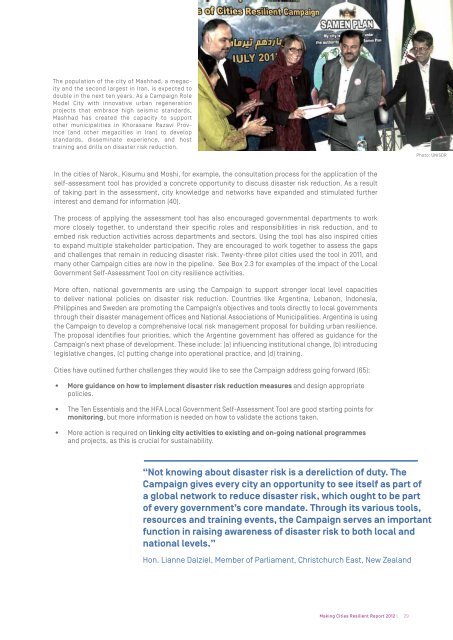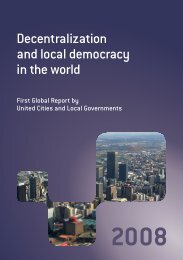Making Cities Resilient Report 2012
Making Cities Resilient Report 2012
Making Cities Resilient Report 2012
Create successful ePaper yourself
Turn your PDF publications into a flip-book with our unique Google optimized e-Paper software.
The population of the city of Mashhad, a megacity<br />
and the second largest in Iran, is expected to<br />
double in the next ten years. As a Campaign Role<br />
Model City with innovative urban regeneration<br />
projects that embrace high seismic standards,<br />
Mashhad has created the capacity to support<br />
other municipalities in Khorasane Razavi Province<br />
(and other megacities in Iran) to develop<br />
standards, disseminate experience, and host<br />
training and drills on disaster risk reduction.<br />
Photo: UNISDR<br />
In the cities of Narok, Kisumu and Moshi, for example, the consultation process for the application of the<br />
self-assessment tool has provided a concrete opportunity to discuss disaster risk reduction. As a result<br />
of taking part in the assessment, city knowledge and networks have expanded and stimulated further<br />
interest and demand for information (40).<br />
The process of applying the assessment tool has also encouraged governmental departments to work<br />
more closely together, to understand their specific roles and responsibilities in risk reduction, and to<br />
embed risk reduction activities across departments and sectors. Using the tool has also inspired cities<br />
to expand multiple stakeholder participation. They are encouraged to work together to assess the gaps<br />
and challenges that remain in reducing disaster risk. Twenty-three pilot cities used the tool in 2011, and<br />
many other Campaign cities are now in the pipeline. See Box 2.3 for examples of the impact of the Local<br />
Government Self-Assessment Tool on city resilience activities.<br />
More often, national governments are using the Campaign to support stronger local level capacities<br />
to deliver national policies on disaster risk reduction. Countries like Argentina, Lebanon, Indonesia,<br />
Philippines and Sweden are promoting the Campaign’s objectives and tools directly to local governments<br />
through their disaster management offices and National Associations of Municipalities. Argentina is using<br />
the Campaign to develop a comprehensive local risk management proposal for building urban resilience.<br />
The proposal identifies four priorities, which the Argentine government has offered as guidance for the<br />
Campaign’s next phase of development. These include: (a) influencing institutional change, (b) introducing<br />
legislative changes, (c) putting change into operational practice, and (d) training.<br />
<strong>Cities</strong> have outlined further challenges they would like to see the Campaign address going forward (65):<br />
• More guidance on how to implement disaster risk reduction measures and design appropriate<br />
policies.<br />
• The Ten Essentials and the HFA Local Government Self-Assessment Tool are good starting points for<br />
monitoring, but more information is needed on how to validate the actions taken.<br />
• More action is required on linking city activities to existing and on-going national programmes<br />
and projects, as this is crucial for sustainability.<br />
“Not knowing about disaster risk is a dereliction of duty. The<br />
Campaign gives every city an opportunity to see itself as part of<br />
a global network to reduce disaster risk, which ought to be part<br />
of every government’s core mandate. Through its various tools,<br />
resources and training events, the Campaign serves an important<br />
function in raising awareness of disaster risk to both local and<br />
national levels.”<br />
Hon. Lianne Dalziel, Member of Parliament, Christchurch East, New Zealand<br />
<strong>Making</strong> <strong>Cities</strong> <strong>Resilient</strong> <strong>Report</strong> <strong>2012</strong> | 29

















